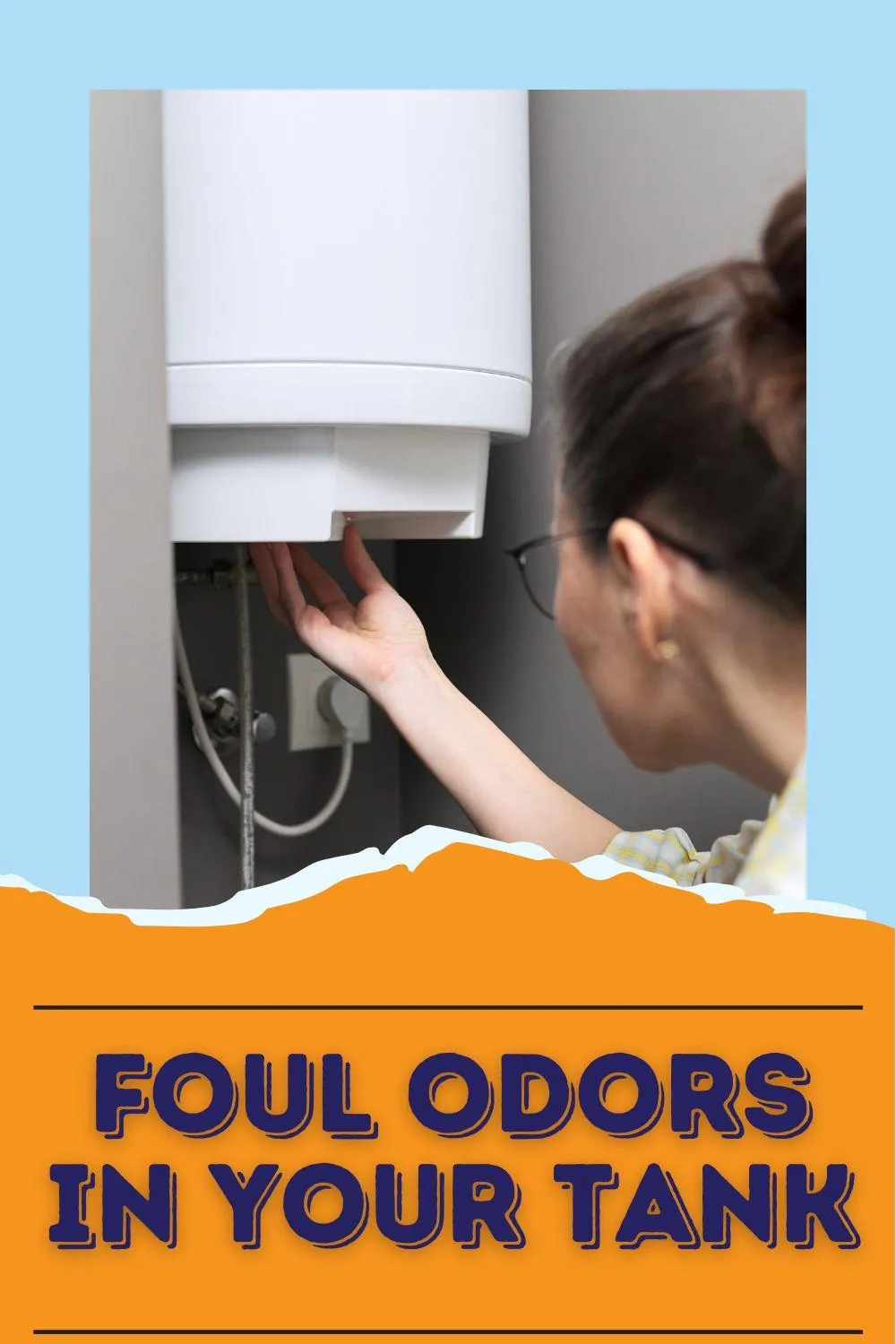Phone: (559) 272-4265
Appliance Repair Tips For Bakersfield, CA Residents

Is Your Water Heater Smelling? Foul Odors Explained
Unpleasant smells from your water heater can be more than just a nuisance; they signal potential issues that need attention. Discover the causes and solutions in our latest blog, "Is Your Water Heater Smelling? Foul Odors Explained," and keep your home fresh and safe! - Appliance Boss
Introduction
Water heaters play an essential role in our daily lives, providing hot water for showers, cooking, and cleaning. However, when foul odors emanate from these indispensable appliances, it can indicate underlying issues that need prompt attention. Ignoring these smells can lead to more significant problems down the road, affecting both your comfort and the longevity of your water heater. This article explores the various causes of water heater smells, how to identify them, and effective solutions to maintain a fresh and efficient appliance.
Understanding the Importance of Addressing Water Heater Odors
Addressing odors from your water heater is crucial for several reasons. First, unpleasant smells can make your living environment uncomfortable and unhygienic. More importantly, they often signal deeper problems, such as bacterial growth or equipment malfunction. By understanding and acting on these odors, you not only enhance your home’s air quality but also ensure that your water heater operates efficiently, reducing energy costs and prolonging its lifespan.

What Causes Water Heater Smells?
Water heater smells can arise from various sources, each requiring different approaches for resolution. Recognizing the specific cause is the first step toward remedying the issue.
Common Sources of Foul Odors in Water Heaters
Several culprits contribute to unpleasant odors in water heaters. These include:
Bacterial Growth: Certain bacteria thrive in warm, stagnant water, particularly in systems with inadequate maintenance.
Sediment Buildup: Over time, minerals and sediment can accumulate at the bottom of the tank, leading to odors as they decompose.
Corroded Anode Rods: Anode rods are designed to prevent corrosion, but once they fail, they can lead to foul smells.
Identifying the Types of Foul Odors
Different odors can indicate different problems within your water heater. Understanding these scents can help pinpoint the underlying issues.
Sulfur Smells: What They Mean for Your Water Heater
A distinctive sulfur or rotten egg smell often points to the presence of hydrogen sulfide gas. This gas can result from bacterial activity in the tank, especially when water sits stagnant for extended periods. In many cases, it’s a clear indication that maintenance is overdue.
Chemical Odors: Recognizing Potential Hazards
Chemical odors may suggest that your water heater is leaking gas or that there are issues with the electrical components. It’s crucial to address these smells immediately, as they can pose serious safety risks, including fire hazards.
Mold and Mildew: Signs of Moisture Problems
The presence of mold or mildew indicates excess moisture around your water heater. This not only contributes to unpleasant odors but can also lead to significant health risks if left unaddressed.
The Role of Bacterial Growth
Bacterial growth is often the unseen enemy behind foul odors in water heaters. It thrives in warm, damp environments, making the tank an ideal breeding ground.
How Bacteria Develops in Water Heaters
Bacteria can proliferate due to stagnant water, particularly in systems that aren’t used regularly or in regions with poor water quality. When temperatures drop, and water sits unused, it creates a perfect environment for bacteria to thrive.
The Connection Between Bacteria and Sulfur Smells
As bacteria feed on organic material in the tank, they produce hydrogen sulfide gas as a byproduct, leading to the characteristic rotten egg smell. Addressing this issue is vital for both odor control and overall water quality.
Faulty Anode Rods and Their Impact
Anode rods are vital components of your water heater, designed to attract corrosive elements in the water, preventing tank deterioration.
What is an Anode Rod?
An anode rod is typically made of magnesium or aluminum and is installed within the tank. It works by sacrificing itself to corrosion, effectively extending the life of the water heater.
How a Worn Anode Rod Contributes to Odors
When an anode rod deteriorates, it can fail to protect the tank effectively. As it degrades, it can release unpleasant smells, signaling the need for replacement.
Signs It’s Time to Replace Your Anode Rod
If you notice a strong sulfur smell or your water heater is over five years old without maintenance, it may be time to inspect and replace the anode rod.
Maintenance Matters
Regular maintenance is crucial for ensuring that your water heater remains odor-free and operates efficiently.
The Importance of Regular Water Heater Maintenance
Routine checks and maintenance can prevent many common issues, including foul odors. A well-maintained water heater runs efficiently and saves you money in the long run.
How to Properly Maintain Your Water Heater to Prevent Odors
Routine flushing of the tank, checking the anode rod, and inspecting for leaks are vital practices. Consider scheduling annual maintenance with a professional to ensure optimal performance.
Troubleshooting Water Heater Smells
When foul odors arise, a systematic approach can help identify the source of the problem.
Step-by-Step Guide to Identify Odors
Start by checking the temperature setting, inspecting the anode rod, and flushing the tank. Look for any visible leaks or signs of corrosion.
Checking for Signs of Leakage or Corrosion
Regularly inspect the area around your water heater for leaks. Corrosion can lead to serious issues, including structural failure and hazardous odors.
Cleaning Your Water Heater
Cleaning your water heater is an essential step in eliminating odors and ensuring it operates efficiently.
How to Flush Your Water Heater to Remove Sediment
Flushing your tank involves draining the water and sediment that accumulate at the bottom. This process not only helps remove odors but also improves heating efficiency.
Safe Cleaning Solutions to Eliminate Odors
Utilize vinegar or baking soda as natural cleaning agents. These solutions can help neutralize odors without harmful chemicals, ensuring a safer home environment.
When to Call a Professional
While some issues can be tackled independently, others require professional intervention.
Signs That Indicate You Need Expert Help
If the odors persist after cleaning or if you notice leaks and corrosion, it’s time to contact a licensed plumber. Never hesitate to seek help for safety concerns.
Choosing the Right Plumber for Water Heater Issues
Look for licensed professionals with good reviews and a strong reputation. They should be well-versed in diagnosing and repairing water heater problems.
Preventive Measures for Odor Control
Taking proactive measures can help keep your water heater smelling fresh and functioning efficiently.
Regular Inspection Tips to Keep Odors at Bay
Conduct routine checks on your water heater, looking for any signs of wear or irregularities. Regularly test the anode rod and flush the tank to prevent buildup.
Best Practices for Water Heater Care
Incorporate regular maintenance into your home care routine. This includes adjusting temperature settings and ensuring proper ventilation.
Understanding Your Water Quality
The quality of the water entering your heater plays a significant role in the odors it produces.
How Hard Water Affects Your Water Heater
Hard water contains minerals that can lead to scale buildup and unpleasant smells. Understanding your water quality can help you take appropriate measures.
Testing Your Water for Quality and Safety
Consider testing your water for mineral content and other impurities. This can help you understand how to best maintain your water heater and ensure safe, clean water.
The Impact of Temperature Settings
Temperature settings can significantly influence odor production and overall efficiency.
How Temperature Settings Can Influence Odors
Keeping your water heater set too low can encourage bacterial growth, while excessively high settings can lead to scalding risks. Aim for a balanced setting for optimal performance.
Adjusting Your Water Heater for Optimal Performance
Adjust the temperature to around 120°F for a safe and efficient balance. This can help mitigate odors while providing sufficient hot water.
Water Heater Age and Efficiency
An aging water heater may struggle to maintain efficiency, leading to increased odors.
When Age Becomes a Factor in Odor Issues
As water heaters age, the likelihood of odors and inefficiencies rises. It’s essential to monitor their performance closely.
Signs It Might Be Time for a Replacement
If your water heater is over ten years old and exhibiting consistent issues, consider replacement. Newer models offer enhanced efficiency and odor control.
The Role of Ventilation
Proper ventilation is crucial for maintaining a safe and odor-free environment.
How Proper Ventilation Affects Water Heater Performance
Adequate airflow around your water heater helps prevent overheating and moisture buildup, which can exacerbate odors.
Ensuring Your Water Heater Has Adequate Airflow
Keep the area around your water heater clear of obstructions. This ensures efficient operation and reduces the risk of unpleasant smells.
Common Myths About Water Heater Odors
Misconceptions can lead to unnecessary panic or neglect when it comes to water heater maintenance.
Debunking Misconceptions Around Smells and Maintenance
One common myth is that all odors signal severe problems. In reality, many can be addressed with simple maintenance and care.
What You Really Need to Know
Educating yourself about your water heater’s needs and common issues can empower you to take action before problems escalate.
Recap of Key Points
Foul odors from your water heater can stem from bacterial growth, faulty components, or maintenance neglect. Regular inspections, cleaning, and understanding your water quality are crucial steps in prevention and remediation.
Conclusion
Keeping your water heater odor-free is not just about comfort; it’s about ensuring a safe and efficient appliance. With a proactive approach, you can tackle odors head-on and enjoy fresh, clean water in your home. Don’t hesitate to take action, whether through routine maintenance or seeking professional help, to maintain the quality and longevity of your water heater.
For any persistent issues or if you need expert assistance, Zip Appliance and Plumbing Repair is here to help. Visit us at www.ziprepairservice.com or call us at (661) 387-2282 for professional plumbing services tailored to your needs.

Is Your Water Heater Smelling? Foul Odors Explained
Unpleasant smells from your water heater can be more than just a nuisance; they signal potential issues that need attention. Discover the causes and solutions in our latest blog, "Is Your Water Heater Smelling? Foul Odors Explained," and keep your home fresh and safe! - Appliance Boss
Introduction
Water heaters play an essential role in our daily lives, providing hot water for showers, cooking, and cleaning. However, when foul odors emanate from these indispensable appliances, it can indicate underlying issues that need prompt attention. Ignoring these smells can lead to more significant problems down the road, affecting both your comfort and the longevity of your water heater. This article explores the various causes of water heater smells, how to identify them, and effective solutions to maintain a fresh and efficient appliance.
Understanding the Importance of Addressing Water Heater Odors
Addressing odors from your water heater is crucial for several reasons. First, unpleasant smells can make your living environment uncomfortable and unhygienic. More importantly, they often signal deeper problems, such as bacterial growth or equipment malfunction. By understanding and acting on these odors, you not only enhance your home’s air quality but also ensure that your water heater operates efficiently, reducing energy costs and prolonging its lifespan.

What Causes Water Heater Smells?
Water heater smells can arise from various sources, each requiring different approaches for resolution. Recognizing the specific cause is the first step toward remedying the issue.
Common Sources of Foul Odors in Water Heaters
Several culprits contribute to unpleasant odors in water heaters. These include:
Bacterial Growth: Certain bacteria thrive in warm, stagnant water, particularly in systems with inadequate maintenance.
Sediment Buildup: Over time, minerals and sediment can accumulate at the bottom of the tank, leading to odors as they decompose.
Corroded Anode Rods: Anode rods are designed to prevent corrosion, but once they fail, they can lead to foul smells.
Identifying the Types of Foul Odors
Different odors can indicate different problems within your water heater. Understanding these scents can help pinpoint the underlying issues.
Sulfur Smells: What They Mean for Your Water Heater
A distinctive sulfur or rotten egg smell often points to the presence of hydrogen sulfide gas. This gas can result from bacterial activity in the tank, especially when water sits stagnant for extended periods. In many cases, it’s a clear indication that maintenance is overdue.
Chemical Odors: Recognizing Potential Hazards
Chemical odors may suggest that your water heater is leaking gas or that there are issues with the electrical components. It’s crucial to address these smells immediately, as they can pose serious safety risks, including fire hazards.
Mold and Mildew: Signs of Moisture Problems
The presence of mold or mildew indicates excess moisture around your water heater. This not only contributes to unpleasant odors but can also lead to significant health risks if left unaddressed.
The Role of Bacterial Growth
Bacterial growth is often the unseen enemy behind foul odors in water heaters. It thrives in warm, damp environments, making the tank an ideal breeding ground.
How Bacteria Develops in Water Heaters
Bacteria can proliferate due to stagnant water, particularly in systems that aren’t used regularly or in regions with poor water quality. When temperatures drop, and water sits unused, it creates a perfect environment for bacteria to thrive.
The Connection Between Bacteria and Sulfur Smells
As bacteria feed on organic material in the tank, they produce hydrogen sulfide gas as a byproduct, leading to the characteristic rotten egg smell. Addressing this issue is vital for both odor control and overall water quality.
Faulty Anode Rods and Their Impact
Anode rods are vital components of your water heater, designed to attract corrosive elements in the water, preventing tank deterioration.
What is an Anode Rod?
An anode rod is typically made of magnesium or aluminum and is installed within the tank. It works by sacrificing itself to corrosion, effectively extending the life of the water heater.
How a Worn Anode Rod Contributes to Odors
When an anode rod deteriorates, it can fail to protect the tank effectively. As it degrades, it can release unpleasant smells, signaling the need for replacement.
Signs It’s Time to Replace Your Anode Rod
If you notice a strong sulfur smell or your water heater is over five years old without maintenance, it may be time to inspect and replace the anode rod.
Maintenance Matters
Regular maintenance is crucial for ensuring that your water heater remains odor-free and operates efficiently.
The Importance of Regular Water Heater Maintenance
Routine checks and maintenance can prevent many common issues, including foul odors. A well-maintained water heater runs efficiently and saves you money in the long run.
How to Properly Maintain Your Water Heater to Prevent Odors
Routine flushing of the tank, checking the anode rod, and inspecting for leaks are vital practices. Consider scheduling annual maintenance with a professional to ensure optimal performance.
Troubleshooting Water Heater Smells
When foul odors arise, a systematic approach can help identify the source of the problem.
Step-by-Step Guide to Identify Odors
Start by checking the temperature setting, inspecting the anode rod, and flushing the tank. Look for any visible leaks or signs of corrosion.
Checking for Signs of Leakage or Corrosion
Regularly inspect the area around your water heater for leaks. Corrosion can lead to serious issues, including structural failure and hazardous odors.
Cleaning Your Water Heater
Cleaning your water heater is an essential step in eliminating odors and ensuring it operates efficiently.
How to Flush Your Water Heater to Remove Sediment
Flushing your tank involves draining the water and sediment that accumulate at the bottom. This process not only helps remove odors but also improves heating efficiency.
Safe Cleaning Solutions to Eliminate Odors
Utilize vinegar or baking soda as natural cleaning agents. These solutions can help neutralize odors without harmful chemicals, ensuring a safer home environment.
When to Call a Professional
While some issues can be tackled independently, others require professional intervention.
Signs That Indicate You Need Expert Help
If the odors persist after cleaning or if you notice leaks and corrosion, it’s time to contact a licensed plumber. Never hesitate to seek help for safety concerns.
Choosing the Right Plumber for Water Heater Issues
Look for licensed professionals with good reviews and a strong reputation. They should be well-versed in diagnosing and repairing water heater problems.
Preventive Measures for Odor Control
Taking proactive measures can help keep your water heater smelling fresh and functioning efficiently.
Regular Inspection Tips to Keep Odors at Bay
Conduct routine checks on your water heater, looking for any signs of wear or irregularities. Regularly test the anode rod and flush the tank to prevent buildup.
Best Practices for Water Heater Care
Incorporate regular maintenance into your home care routine. This includes adjusting temperature settings and ensuring proper ventilation.
Understanding Your Water Quality
The quality of the water entering your heater plays a significant role in the odors it produces.
How Hard Water Affects Your Water Heater
Hard water contains minerals that can lead to scale buildup and unpleasant smells. Understanding your water quality can help you take appropriate measures.
Testing Your Water for Quality and Safety
Consider testing your water for mineral content and other impurities. This can help you understand how to best maintain your water heater and ensure safe, clean water.
The Impact of Temperature Settings
Temperature settings can significantly influence odor production and overall efficiency.
How Temperature Settings Can Influence Odors
Keeping your water heater set too low can encourage bacterial growth, while excessively high settings can lead to scalding risks. Aim for a balanced setting for optimal performance.
Adjusting Your Water Heater for Optimal Performance
Adjust the temperature to around 120°F for a safe and efficient balance. This can help mitigate odors while providing sufficient hot water.
Water Heater Age and Efficiency
An aging water heater may struggle to maintain efficiency, leading to increased odors.
When Age Becomes a Factor in Odor Issues
As water heaters age, the likelihood of odors and inefficiencies rises. It’s essential to monitor their performance closely.
Signs It Might Be Time for a Replacement
If your water heater is over ten years old and exhibiting consistent issues, consider replacement. Newer models offer enhanced efficiency and odor control.
The Role of Ventilation
Proper ventilation is crucial for maintaining a safe and odor-free environment.
How Proper Ventilation Affects Water Heater Performance
Adequate airflow around your water heater helps prevent overheating and moisture buildup, which can exacerbate odors.
Ensuring Your Water Heater Has Adequate Airflow
Keep the area around your water heater clear of obstructions. This ensures efficient operation and reduces the risk of unpleasant smells.
Common Myths About Water Heater Odors
Misconceptions can lead to unnecessary panic or neglect when it comes to water heater maintenance.
Debunking Misconceptions Around Smells and Maintenance
One common myth is that all odors signal severe problems. In reality, many can be addressed with simple maintenance and care.
What You Really Need to Know
Educating yourself about your water heater’s needs and common issues can empower you to take action before problems escalate.
Recap of Key Points
Foul odors from your water heater can stem from bacterial growth, faulty components, or maintenance neglect. Regular inspections, cleaning, and understanding your water quality are crucial steps in prevention and remediation.
Conclusion
Keeping your water heater odor-free is not just about comfort; it’s about ensuring a safe and efficient appliance. With a proactive approach, you can tackle odors head-on and enjoy fresh, clean water in your home. Don’t hesitate to take action, whether through routine maintenance or seeking professional help, to maintain the quality and longevity of your water heater.
For any persistent issues or if you need expert assistance, Zip Appliance and Plumbing Repair is here to help. Visit us at www.ziprepairservice.com or call us at (661) 387-2282 for professional plumbing services tailored to your needs.
If your dryer has been giving you problems, contact Zip Appliance Repair & Service at (661) 387-2282

Appliance Repair In A Zip
If you need a dryer repair call our Team at (661) 387-2282, or visit our online scheduling page to request service.
Appliance Repair
Plumbing Repair Services
HAVE A QUESTION, CALL (661) 387-2282

Online Offers
Take advantage of our online discount offers - save time and money...

Residential & Commercial appliances
See what our company can do for you

Appliance Repair Tips
If your appliance is not working properly...

1405 Commercial Way ste 100
Bakersfield, CA 93309
Lic # 1116346
Equipment We Sevice
- A Call To Confirm Your Appointment Time
- A Email Detailing Your Assigned Technician
- Information Needed Before The Repair Can Be Started
- An Estimate Of Work To Be Done
© 2025 ZIP APPLIANCE REPAIR & SERVICE LLC








